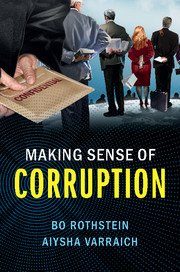Book contents
- Making Sense of Corruption
- Making Sense of Corruption
- Copyright page
- Contents
- Figures and Tables
- Acknowledgements
- 1 Corruption and the Relevance of Political Science
- 2 Mapping-Related Disciplines
- 3 The Evolution of Corruption as a Concept
- 4 Corruption and Human Rights
- 5 Corruption as the Connecting Core
- 6 Corruption and Patronage
- 7 Corruption and Patrimonialism
- 8 Corruption, State Capture and Political Particularism
- 9 The Chinese Exception and Alternative
- 10 In Conclusion: What Is the Opposite of Corruption?
- References
- Index
- References
References
Published online by Cambridge University Press: 24 March 2017
- Making Sense of Corruption
- Making Sense of Corruption
- Copyright page
- Contents
- Figures and Tables
- Acknowledgements
- 1 Corruption and the Relevance of Political Science
- 2 Mapping-Related Disciplines
- 3 The Evolution of Corruption as a Concept
- 4 Corruption and Human Rights
- 5 Corruption as the Connecting Core
- 6 Corruption and Patronage
- 7 Corruption and Patrimonialism
- 8 Corruption, State Capture and Political Particularism
- 9 The Chinese Exception and Alternative
- 10 In Conclusion: What Is the Opposite of Corruption?
- References
- Index
- References
Information
- Type
- Chapter
- Information
- Making Sense of Corruption , pp. 149 - 167Publisher: Cambridge University PressPrint publication year: 2017
